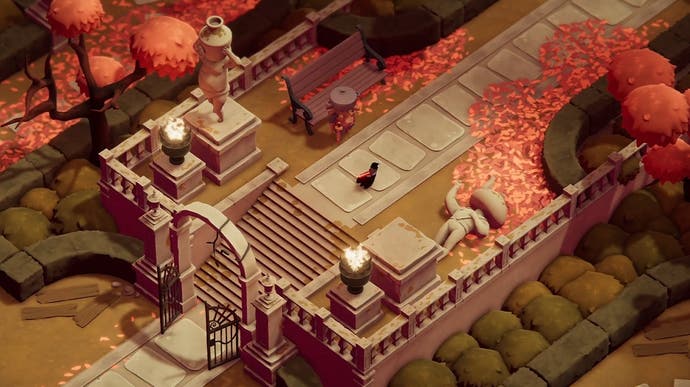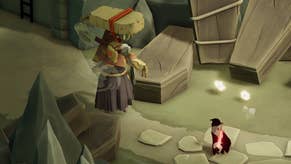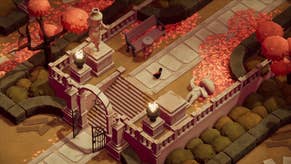Death's Door review - wonderfully honed Zelda-like with a soulful edge
Caw!
I keep coming back to rhythm with games like this. Rhythm's always had a part to play in action games, where good combat is a dance, and bad a little out-of-step. It's all in the one, two, dodge, the little passive mental counter ticking over from that boss' second smash to the third, the half a beat between the third and the jump.
So it is with Death's Door, a sumptuously beautiful Zelda-like about the immutable beat of time, the rhythm of life and death. Except there's something else, hard to place, that seems to give it something extra. Death's Door has something, like a flavour that maybe isn't actually a flavour, more of a sensation. Umami. What's the umami of dance?
Acid Nerve's last game was Titan Souls, which came out way back in 2015. Titan Souls is one of those games that's all about simplicity - you get one arrow, you die in one hit, you have a world to explore and quite a few bosses to kill, off you go. Its cleverness is the classic indie creative cleverness, where you give yourself an arbitrary restriction to keep things focused, keep the concept pure, and then you just build outwards from there. And it's important context here, because build outwards from Titan Souls and you'll arrive more or less exactly at Death's Door, a game with no restrictions but plenty of restraint. Bosses, combat, a mysterious overworld, some lightly puzzling environments - the totality of the first is the foundation of the next, and so the impression is one of clarity: as a studio, Acid Nerve comes across as having a clear plan, a clear trajectory, but then as a result of that so do its games.
Death Door's clarity - the balance it strikes between the apparent sparsity of the world and the combat, and the intricacies that are actually buried in there - is everything. The setup is you are a crow, who is employed as a reaper with a load of other, more bureaucratic crows in a kind of civil service of the afterlife. Your regular job is to go out and gather the souls of the dead, and when someone's found a way to cheat death, extending their life beyond its natural length, you've got to whack them with your sword first.
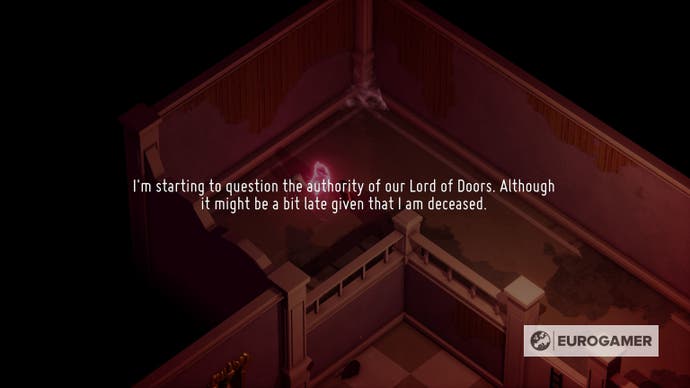
Already this is sounding complicated, but it isn't, thanks to a recurring, intangible kind of charm. Death's Door is a little dark, and often quite melancholy. A gravedigger friend - who himself longs for the peace of death but just can't seem to die - will read eulogies for slain foes. Defying death corrupts souls, here, and so another friend wants peace for his defiant grandmother who can't face another loss. Its earthy, pastel worlds (the whole thing feels like earthenware, actually, but maybe a piece that's still an hour or two from setting, a world that seems capable of both being squished like clay and smashed like a vase) are half-empty and half-alive, full of cobwebs, fallen leaves, sunken ruins, forests. Characters caught between life and death and a world in permanent autumn.
But it's also funny. Very funny, actually, in that true comedy kind of way, the comedy of surprise, like a sign that's still legible after you accidentally lop half of it off with a sword, but just the bottom half of the text - and the other half too, if you read the bit now lying on the floor. Characters are bizarre. Bookish crows for one, but they're matched with an octopus using a cadaver to hide out as a man, a guy with a pot for a head, enchanted urns and blobs of slime, but everything animated with wonderful attention, your little crow cocking its head from time to time, a slumped shoulder here and a shrug there, the pitter-patter of crow's feet on wood or stone. Animation with an eye for humanity, bizarre characters that feel bizarrely alive.
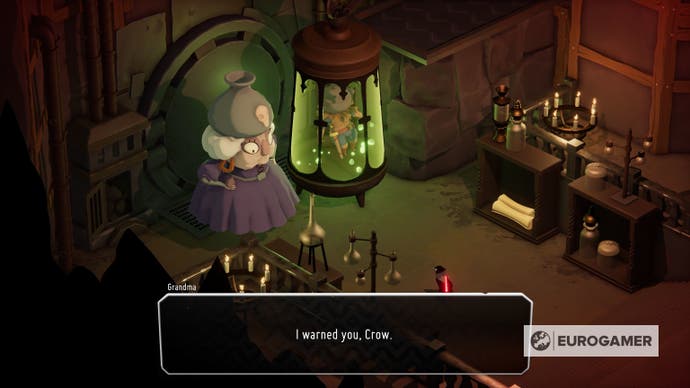
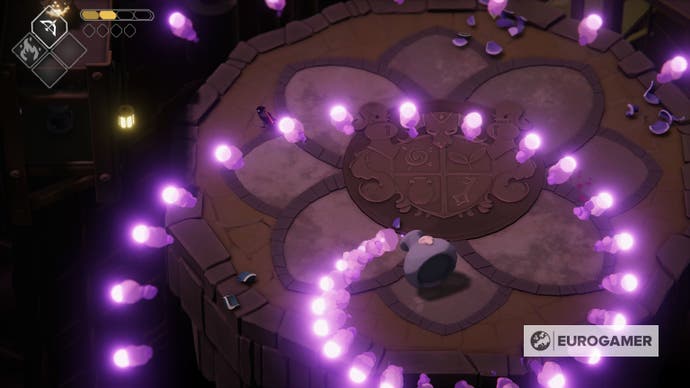
It all sounds so gentle! But it isn't, so: combat. Death's Door is pleasantly challenging, as in occasionally a little demanding, mechanically, but always doable and never cruel. Your main task is to defeat three main bosses, each deep within their own world accessed from the main kind of hub one (and also short-hopped between, via doors that unlock as you go and provide a kind of fast travel by taking you back to the actual hub of the reaper bureau, where you can hop into other doors to elsewhere). Each one unlocks a new skill beyond your sword, like a bow or throwable bombs - hello Zelda - but which also, metroidvania-style, unlocks new paths and new parts of the world.
The bosses themselves are a treat, able to build on the brilliantly inventive fights from Titan Souls by adding more layers, more rounds of progression, thanks to you having a little more health to play with and a few more means of attack. Several of them, including that incredible mobile battle-chateau you might've seen from trailers but also plenty more, will stick with me as some of the most memorable boss fights I've played, and all of them have that special something, the sense of combat as live-action puzzle, as much as mechanical test. The actual fighting itself gets more sophisticated the more you unlock, starting tight but a tad basic and working up to something of a frantic, entrancing, bullet-hell climax of grunts and mini-bosses and battable projectiles towards the end (you can actually unlock enhanced versions of the skills, which add another layer of empowerment and subtlety to combat, but I won't spoil things by telling you how).
"What a beautifully concise, measured, exacting, deliberate thing Death's Door is..."
The flipside of this is the environment, again, which is littered with secrets. Hidden tunnels, disguised ladders, teasing, unreachable levers, gaps in hedges and curiously destructible-looking walls are everywhere. All of them lead somewhere good, to useful upgrade currency or actually interesting - sometimes functional! - collectibles, secret upgrades to abilities, stamina and health. Tying traversal to abilities means it's always snappy, and the beautiful sadness of the world means it's always mysterious, always enticing, backtracking never a chore.
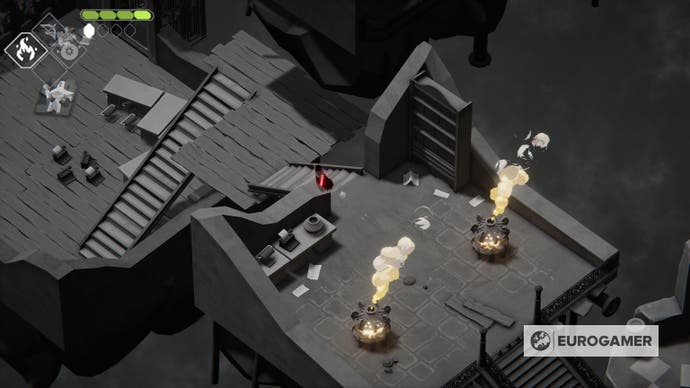
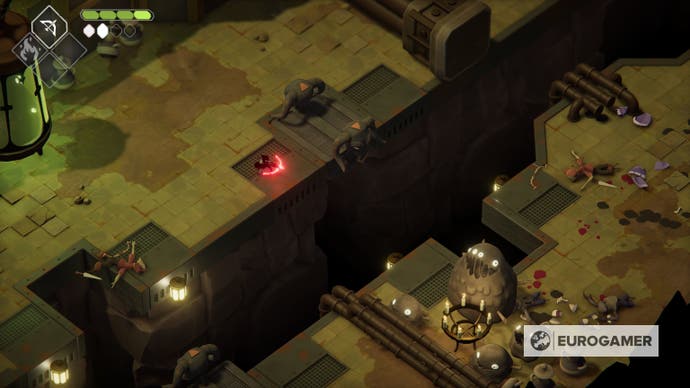
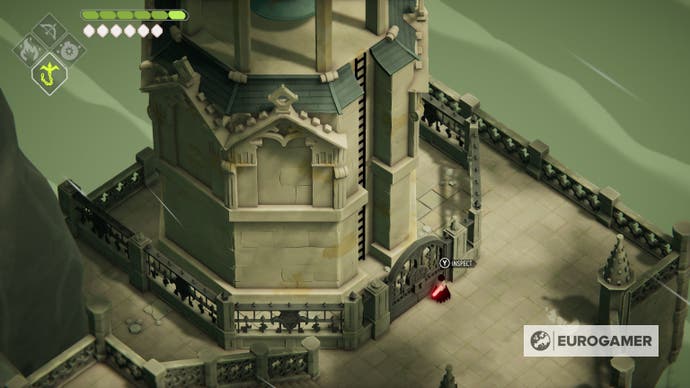
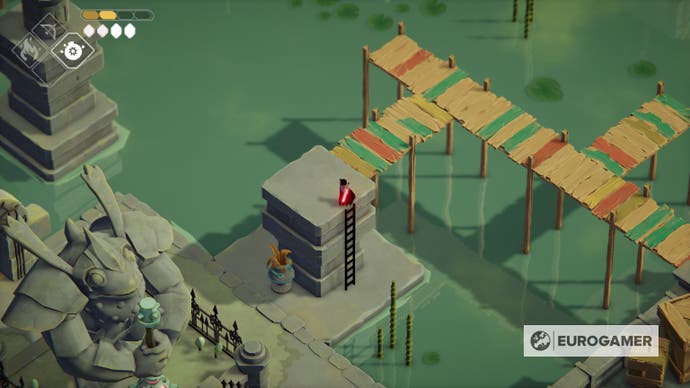
It's that combination that's the magic. The two Miyazakis are everywhere, as much as it's painful to keep referencing them in games, subtly in the plinky plonk keystrokes of sad pianos and worlds in mournful transition (Hayao) and the hands-off, unseen guidance through challenge (Hidetaka). And also overtly - which makes me feel much better about the reference - in crotchety old grandma witches in their enchanted castles with mechanical bowels, and sharp-toothed chests that gobble you up. And the little guy with a big sword.
What a pair to reference, though. What a phenomenal pedigree for Acid Nerve to build upon, not just from their own brilliant debut but from Zelda, via 16-bit adventure, to this, without a shred of baggage picked up along the way. What a beautifully concise, measured, exacting, deliberate thing Death's Door is. How warm and funny and sad. How textured. And how fun! It is absolutely unmissable.
